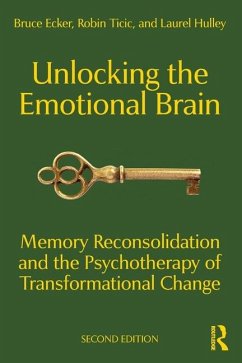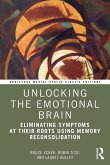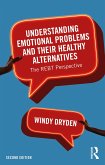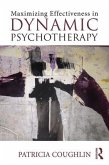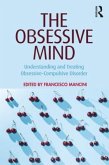This highly influential volume, now in a much-expanded second edition, delivers major advances for psychotherapy, all empirically grounded in memory reconsolidation neuroscience. A great increase of therapeutic effectiveness can be gained, thanks to a clear map of the brain's innate core process of transformational change-a process that does not require use of any particular system or techniques and is therefore remarkably versatile.
Twenty-six case examples show the decisive ending of a vast range of major symptoms, including depression, anxiety, panic, shame, self-devaluing, anger, perfectionism, alcohol abuse, sexual aversion, compulsive eating and obesity, paralyzed self-expression, and teen ADHD-all transformed through deeply resolving underlying disturbances such as complex trauma, lifelong oppression by systemic racism and homophobia, childhood sexual molestation, parental narcissistic domination, violent assault trauma, natural disaster trauma, and childhood traumatic aloneness and neglect.
This is a transdiagnostic, transtheoretical, lucid understanding of therapeutic action, based, for the first time in the history of the psychotherapy field, on rigorous empirical knowledge of an internal mechanism of change, and it achieves a fundamental unification of the confusingly fragmented psychotherapy field: diverse systems no longer seem to belong to different worlds, because they now form a wonderful repertoire of options for facilitating the same core process of transformational change, as shown in case examples from AEDP, Coherence Therapy, EFT, EMDR, IFS, IPNB, ISTDP, psychedelic-assisted therapy, and SE.
It's now clear why therapy systems that differ strikingly in technique and theory can produce the same quality of liberating change. Practitioners who value deep connection with their clients are richly rewarded by the experiential depth that this core process accesses, where no awareness had previously reached, whether sessions are done in person or via online video. It is an embarrassment of riches, because in addition we gain the decisive resolution of several longstanding, polarizing debates regarding the nature of symptom production, the prevalence of attachment issues, the operation of traumatic memory, the functions of the client-therapist relationship, the role of emotional arousal in the process of change, and the relative importance of specific versus non-specific factors.
Twenty-six case examples show the decisive ending of a vast range of major symptoms, including depression, anxiety, panic, shame, self-devaluing, anger, perfectionism, alcohol abuse, sexual aversion, compulsive eating and obesity, paralyzed self-expression, and teen ADHD-all transformed through deeply resolving underlying disturbances such as complex trauma, lifelong oppression by systemic racism and homophobia, childhood sexual molestation, parental narcissistic domination, violent assault trauma, natural disaster trauma, and childhood traumatic aloneness and neglect.
This is a transdiagnostic, transtheoretical, lucid understanding of therapeutic action, based, for the first time in the history of the psychotherapy field, on rigorous empirical knowledge of an internal mechanism of change, and it achieves a fundamental unification of the confusingly fragmented psychotherapy field: diverse systems no longer seem to belong to different worlds, because they now form a wonderful repertoire of options for facilitating the same core process of transformational change, as shown in case examples from AEDP, Coherence Therapy, EFT, EMDR, IFS, IPNB, ISTDP, psychedelic-assisted therapy, and SE.
It's now clear why therapy systems that differ strikingly in technique and theory can produce the same quality of liberating change. Practitioners who value deep connection with their clients are richly rewarded by the experiential depth that this core process accesses, where no awareness had previously reached, whether sessions are done in person or via online video. It is an embarrassment of riches, because in addition we gain the decisive resolution of several longstanding, polarizing debates regarding the nature of symptom production, the prevalence of attachment issues, the operation of traumatic memory, the functions of the client-therapist relationship, the role of emotional arousal in the process of change, and the relative importance of specific versus non-specific factors.
"Ecker, Ticic, and Hulley have outdone themselves in expanding and enhancing a book that is already considered by many a modern classic in the field. The first edition of this book influenced countless therapists around the world. I suspect this second edition is destined to have an even greater impact."
Alexandre Vaz, PhD, director of training, Sentio Counseling Center, and editor of the APA series The Essentials of Deliberate Practice
"The first edition of Unlocking the Emotional Brain has been widely and rightly celebrated for its groundbreaking, integrative clinical framework, and this new edition offers the reader all that and even more. All psychotherapists and clinical researchers can find tremendous value in the clarity of this book's teaching of the therapeutic power and unifying reach of memory reconsolidation. With its publication, the field of psychotherapy has made a significant, evolutionary, and transformative leap forward."
David S. Elliott, PhD, co-author of Attachment Disturbances in Adults
FROM THE FIRST EDITON:
"Truly a revolutionary book."
Jaak Panksepp, PhD, founder of the field of affective neuroscience, Emeritus Professor of Psychology at Bowling Green State University
"Beautifully written, the authors present an elegant integration of neuroscientific findings and psychotherapy technique, resulting in a step-by-step method for relieving long-standing symptoms and suffering. Even the most seasoned clinician will be inspired to learn from these masters."
Patricia Coughlin, PhD, clinical faculty at the University of New Mexico School of Medicine, author of Maximizing Therapeutic Effectiveness in Dynamic Psychotherapy
"Unlocking the Emotional Brain... brings the recent ground-breaking brain research on memory reconsolidation to the mental health field...This is the first psychotherapy book to delineate the sequence of experiences the brain requires to heal. No matter how good a therapist you already are, reading this book will make you better."
Ricky Greenwald, PsyD, founder/Director, Trauma Institute and Child Trauma Institute, author of EMDR Within a Phase Model of Trauma-Informed Treatment
"A transtheoretical, effective and efficient approach...for deep, transformational change in pernicious emotional implicit learnings... This is a significant 'breakthrough' book."
Michael F. Hoyt, PhD, author of Brief Psychotherapies: Principles and Practices
"A refreshing and audacious book that throws open the doors and blows the dust from the corners of clinical practice... [T]he authors...add a startingly effective process to the repertoire of every clinician [and] build powerful alliances across clinical approaches..."
Ann Weiser Cornell, PhD, author of Focusing in Clinical Practice: The Essence of Change
"Unlocking the Emotional Brain is destined to be a landmark publication... I'm sensing an emerging consensus in the field of psychotherapy... I think memory reconsolidation and this book could be the hub around which the various approaches unite... It is essential reading for therapists of all stripes..."
David Van Nuys, PhD, Emeritus Professor of Psychology, Sonoma State University
Alexandre Vaz, PhD, director of training, Sentio Counseling Center, and editor of the APA series The Essentials of Deliberate Practice
"The first edition of Unlocking the Emotional Brain has been widely and rightly celebrated for its groundbreaking, integrative clinical framework, and this new edition offers the reader all that and even more. All psychotherapists and clinical researchers can find tremendous value in the clarity of this book's teaching of the therapeutic power and unifying reach of memory reconsolidation. With its publication, the field of psychotherapy has made a significant, evolutionary, and transformative leap forward."
David S. Elliott, PhD, co-author of Attachment Disturbances in Adults
FROM THE FIRST EDITON:
"Truly a revolutionary book."
Jaak Panksepp, PhD, founder of the field of affective neuroscience, Emeritus Professor of Psychology at Bowling Green State University
"Beautifully written, the authors present an elegant integration of neuroscientific findings and psychotherapy technique, resulting in a step-by-step method for relieving long-standing symptoms and suffering. Even the most seasoned clinician will be inspired to learn from these masters."
Patricia Coughlin, PhD, clinical faculty at the University of New Mexico School of Medicine, author of Maximizing Therapeutic Effectiveness in Dynamic Psychotherapy
"Unlocking the Emotional Brain... brings the recent ground-breaking brain research on memory reconsolidation to the mental health field...This is the first psychotherapy book to delineate the sequence of experiences the brain requires to heal. No matter how good a therapist you already are, reading this book will make you better."
Ricky Greenwald, PsyD, founder/Director, Trauma Institute and Child Trauma Institute, author of EMDR Within a Phase Model of Trauma-Informed Treatment
"A transtheoretical, effective and efficient approach...for deep, transformational change in pernicious emotional implicit learnings... This is a significant 'breakthrough' book."
Michael F. Hoyt, PhD, author of Brief Psychotherapies: Principles and Practices
"A refreshing and audacious book that throws open the doors and blows the dust from the corners of clinical practice... [T]he authors...add a startingly effective process to the repertoire of every clinician [and] build powerful alliances across clinical approaches..."
Ann Weiser Cornell, PhD, author of Focusing in Clinical Practice: The Essence of Change
"Unlocking the Emotional Brain is destined to be a landmark publication... I'm sensing an emerging consensus in the field of psychotherapy... I think memory reconsolidation and this book could be the hub around which the various approaches unite... It is essential reading for therapists of all stripes..."
David Van Nuys, PhD, Emeritus Professor of Psychology, Sonoma State University

